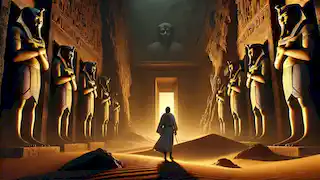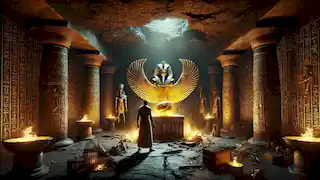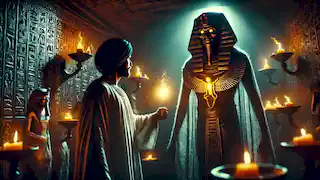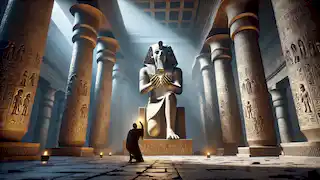In the heart of ancient Egypt, where the burning sands stretched far beyond the horizon and the Nile flowed like a shimmering ribbon of life, a powerful legend was born. It was a tale whispered among priests and scholars, handed down from generation to generation. It was said that within the sacred land of Egypt lay a force so ancient and so powerful that it could transcend the mortal plane, a force guarded by the gods themselves. This force was embodied in the form of a simple creature: the scarab beetle.
But the scarab was no ordinary creature. It was revered as a symbol of Khepri, the god of creation and rebirth, who was said to roll the sun across the sky each day, just as the scarab beetle rolls its dung ball across the earth. The Egyptians believed that the scarab held the secret to immortality, the key to eternal life. And so, it became a symbol not only of the divine but also of hope and power.
Our story begins in the bustling city of Thebes, where a young priest named Amenu is about to embark on a journey that will take him deep into the heart of Egypt’s mysteries, a journey that will uncover the ancient secrets of the scarab and the gods themselves. Amenu had always felt a deep connection to the gods. He had been raised within the temple of Ra, the sun god, from a young age, and had shown great promise as a priest. His dedication and reverence had earned him a place among the highest ranks of the priesthood by the time he reached manhood. Each day, he would tend to the sacred flame, ensuring that Ra's eternal light would burn brightly for all of Egypt. But despite his devotion, Amenu was plagued by a feeling of restlessness. He was often haunted by dreams that he could not understand—dreams that felt too real to be mere figments of his imagination. In these dreams, he would find himself standing alone in the vast desert under a blood-red sky. Before him would appear a giant scarab beetle, glowing with an otherworldly light, its eyes burning like embers in the night. "Amenu," the scarab would whisper, though its mouth never moved. "You have been chosen." Chosen for what, Amenu did not know. But the dreams persisted, growing more vivid and more frequent with each passing night. The scarab's voice would echo in his mind long after he awoke, a constant reminder that something greater was at work in his life. He could no longer ignore the signs. The gods were calling to him, and he knew that he must answer. One morning, after a particularly intense dream, Amenu rose from his bed with a newfound sense of purpose. He knew that he could no longer remain within the temple walls, content with his duties as a priest. There was a greater destiny awaiting him, one that he could not yet fully comprehend. He decided to seek the counsel of Ptahotep, the high priest of Amun-Ra, who had long been a mentor and father figure to him. The journey to Ptahotep's private chambers took Amenu through the grand halls of the temple, past towering columns adorned with hieroglyphs and statues of the gods. The temple was a place of great beauty and power, a testament to the might of the Egyptian gods. Yet, as he walked, Amenu felt a growing sense of unease. The dreams had shaken him to his core, and he could not shake the feeling that his life was about to change in ways he could not predict. When he arrived at Ptahotep's chambers, the elderly priest greeted him with a warm smile, though his keen eyes quickly detected the worry etched on Amenu's face. "What troubles you, my son?" Ptahotep asked, his voice gentle yet firm. Amenu hesitated for a moment, then began to speak. He told Ptahotep of the dreams that had plagued him, of the scarab beetle and its strange message. He spoke of the unease that had settled over him like a heavy shroud, and of his growing belief that the gods were calling him to something greater. Ptahotep listened in silence, his expression growing more serious with each passing word. When Amenu finished, the high priest was silent for a long moment, his brow furrowed in thought. "The scarab," Ptahotep finally said, his voice grave, "is no ordinary creature. It is a symbol of the god Khepri, the god of creation and rebirth. Khepri is one of the most ancient and powerful of the gods, and his domain is the cycle of life and death. If the scarab has appeared to you in your dreams, then you are indeed chosen—for a task that could alter the fate of Egypt itself." Amenu's heart raced as Ptahotep spoke of an ancient prophecy, one that had been passed down through the priesthood for generations. The prophecy told of a time when darkness would fall over the land, a time when Egypt would be plunged into chaos and despair. Only the power of the sacred scarab, the Scarab of Khepri, could restore the light and save Egypt from destruction. But the Scarab of Khepri was no ordinary relic. It was said to be a powerful artifact, imbued with the essence of the god himself. It had been lost for centuries, hidden away in the tomb of a forgotten pharaoh, its location known only to the gods. "You must go to the Valley of Kings," Ptahotep instructed, his voice heavy with the weight of the task he was assigning. "There, in the tomb of the Pharaoh Neferkare, lies the Scarab of Khepri. But be warned, Amenu, the tomb is guarded by powerful magic and deadly traps. Many have sought the scarab before you, and none have returned." Amenu felt a shiver run down his spine at the high priest's words, but he did not falter. He knew that this was his destiny, the path that the gods had laid out for him. With Ptahotep's blessing, he set out the next day, armed with nothing but his faith and a small talisman blessed by the priests of Ra. His journey would take him deep into the desert, through treacherous terrain and harsh conditions. But Amenu was determined. The fate of Egypt hung in the balance, and he would not fail. The journey to the Valley of Kings was long and arduous. Amenu traveled for days, his body weary from the relentless heat of the desert sun and the cold bite of the desert nights. The sand beneath his feet seemed to stretch on forever, an endless sea of gold that threatened to swallow him whole. Yet he pressed on, driven by the visions that haunted his dreams and the whispers of the scarab that seemed to grow louder with each step he took. As he neared the Valley of Kings, the landscape began to change. The flat expanse of the desert gave way to towering cliffs and deep ravines, their jagged edges cutting into the sky like the teeth of some great beast. The valley was a place of death, where the pharaohs of old had been laid to rest in their grand tombs, their bodies preserved for eternity by the skilled hands of the embalmers. But it was also a place of power, where the spirits of the dead still lingered, their presence felt in the very air. Amenu felt a growing sense of dread as he approached the entrance to the valley. The wind whispered through the rocks, carrying with it the faint echoes of voices long silenced by time. The ground beneath his feet seemed to tremble, as if the earth itself was warning him to turn back. But Amenu did not waver. He had come too far to turn back now. The tomb of Pharaoh Neferkare was hidden deep within the valley, its entrance concealed by centuries of shifting sand and stone. It had taken Amenu several days of searching before he finally uncovered the entrance, a narrow passageway carved into the rock, barely wide enough for a man to pass through. The air inside was cool and damp, a stark contrast to the scorching heat of the desert above. With a deep breath, Amenu stepped into the tomb, his heart pounding in his chest. The walls of the passageway were lined with hieroglyphs, their ancient symbols telling the story of Neferkare's reign and his journey to the afterlife. The further Amenu ventured into the tomb, the more elaborate the carvings became, depicting scenes of gods and monsters, of battles and triumphs. It was as if the very walls of the tomb were alive, their stories etched into the stone for all eternity. After what felt like hours of walking, Amenu finally reached the heart of the tomb. Before him stood a massive chamber, its walls covered in intricate murals depicting the life of Neferkare. In the center of the chamber was a stone pedestal, and atop it rested the object of Amenu's quest: the Scarab of Khepri. The scarab was larger than Amenu had expected, its body made of pure gold, its wings outstretched as if ready to take flight. Its eyes, made of polished obsidian, seemed to glow with an inner light, as if the scarab was alive and watching him. Amenu approached the relic with reverence, his heart racing in his chest. As his fingers closed around the scarab, a sudden blast of energy surged through him, knocking him to the ground. The air around him crackled with electricity, and the chamber trembled as if the very earth was shaking. Stones began to fall from the ceiling, crashing to the ground around him as the tomb began to collapse. Desperately, Amenu clutched the scarab to his chest and scrambled towards the exit. The ground shook beneath his feet, and the walls of the tomb seemed to close in around him. He could hear the deafening roar of stone grinding against stone, the sound of the tomb sealing itself shut. But by some miracle, Amenu managed to escape the collapsing chamber just as the entrance caved in completely. Breathing heavily, Amenu stood in the open air once more, the scarab still clutched tightly in his hand. He had done it—he had found the lost Scarab of Khepri. But as he gazed down at the glowing relic in his hand, he could not shake the feeling that his journey was far from over. The scarab's power had been unleashed, and with it came great danger. Amenu's return to Thebes was met with great celebration. Word of his success spread quickly throughout the city, and the people hailed him as a hero. They believed that with the Scarab of Khepri in his possession, Amenu had the power to protect Egypt from any threat. But despite the adulation of the people, Amenu could not shake the feeling that something was terribly wrong. That night, as Amenu lay in his chambers, the air grew heavy with the scent of incense, and a deep chill settled over the room. The flames of the oil lamps flickered and danced, casting eerie shadows on the walls. Then, from the darkness, a figure appeared—a shadowy apparition draped in the regal robes of a pharaoh long dead. "Foolish mortal," the pharaoh hissed, his voice like the rustling of dry leaves. "You have awakened a power you cannot control. The scarab is mine, and I will stop at nothing to reclaim it." Amenu recoiled in fear as the pharaoh's ghostly form moved closer, his eyes burning with an unholy fire. The pharaoh reached out towards him, his skeletal hand stretching forth to seize the scarab. But just as the phantom's hand was about to close around Amenu's throat, a blinding light filled the room. The scarab, glowing with an otherworldly energy, rose into the air between them. The light intensified, and the pharaoh let out a scream of rage and pain before vanishing into the night, his form dissipating like smoke on the wind. Shaken, Amenu realized that the power of the scarab was both a blessing and a curse. It had protected him from the vengeful spirit of the pharaoh, but it had also drawn the attention of forces far beyond his control. The scarab's power was immense, but it came with great danger. If he was to survive, Amenu would need to understand the true nature of the scarab and the curse that bound it. The next morning, Amenu sought out Ptahotep once more. The old priest listened gravely as Amenu recounted the events of the previous night, his expression growing more concerned with each passing moment. "The curse of the pharaoh is a powerful one," Ptahotep said, his voice heavy with the weight of his words. "It is said that those who disturb the tombs of the kings will be haunted by their spirits until the curse is lifted. The scarab may protect you, but it has also bound you to the pharaoh's curse." Amenu felt a chill run down his spine. He had heard stories of the pharaohs' curses, tales of men driven mad by the spirits of the dead, their lives consumed by the wrath of the kings they had disturbed. But Amenu knew that he could not allow fear to rule him. He had been chosen by the gods for a reason, and he would not abandon his quest now. According to ancient texts, the curse could only be lifted by returning the scarab to its rightful place—in the hands of Khepri himself. But to do so, Amenu would need to journey to the sacred temple of Heliopolis, where the gods were said to walk among men. There, in the heart of the temple, lay a gateway to the realm of the gods, a place where mortals could commune with the divine. And so, with a heavy heart, Amenu set out once more, the scarab safely tucked away in a small pouch at his side. His journey would take him across the Nile and through treacherous lands, but he knew that he had no choice. The curse of the pharaoh would not rest until the scarab was returned. The temple of Heliopolis was one of the most sacred sites in all of Egypt. Built in honor of the sun god Ra and his divine aspect Khepri, the temple was a place of great power and reverence. Its towering columns and intricately carved statues rose high into the sky, a testament to the might of the gods. The air around the temple crackled with energy, and the very stones seemed to hum with the presence of the divine. As Amenu approached the temple, he felt a deep sense of awe and reverence wash over him. This was no ordinary temple—this was a place where the gods themselves had walked, a place where the boundary between the mortal realm and the divine was thin. The priests of the temple were said to possess great knowledge and power, and it was here that Amenu hoped to find the answers he sought. Inside the temple, the air was thick with the smell of incense and the soft chanting of the priests. The walls were adorned with murals depicting the creation of the world, the birth of the gods, and the endless cycle of life and death. At the far end of the temple stood a massive statue of Khepri, his beetle-shaped head and outstretched arms reaching towards the heavens. Amenu knelt before the statue, his heart filled with reverence and fear. Carefully, he removed the scarab from its pouch and placed it in the hands of the statue. For a moment, nothing happened. Then, with a sound like the beating of wings, the scarab began to glow. A brilliant light filled the temple, and the air crackled with energy as the scarab's power was returned to its rightful owner. As the light faded, Amenu felt a sense of peace wash over him. The curse had been lifted. The pharaoh's spirit was at rest, and the scarab had been returned to Khepri, where it belonged. But as Amenu rose to leave, a voice echoed through the temple—Khepri's voice, deep and resonant, like the rumbling of the earth itself. "You have done well, Amenu," the god said. "You have proven yourself worthy. The power of the scarab is now yours to command, but use it wisely. For with great power comes great responsibility." Amenu bowed his head in gratitude as the light of the scarab faded. He knew that his journey was far from over, but for now, he had found peace. The legend of the scarab would live on, not as a tale of darkness and curses, but as a story of hope and redemption. Years passed, and Amenu's name became legend. The people of Egypt spoke of the young priest who had saved the land from darkness, and the power of the scarab became a symbol of hope for generations to come. But the story did not end there. The scarab's power, though dormant, still lingered in the land, waiting for the next chosen one to rise and continue the cycle of creation and rebirth. And so, the legend of the scarab lived on, passed down from generation to generation, a reminder of the power of the gods and the enduring strength of the human spirit.Chapter One: The Priest's Dream

Chapter Two: The Valley of Kings

Chapter Three: The Pharaoh's Curse

Chapter Four: The Temple of Heliopolis

Epilogue: The Scarab's Legacy




















